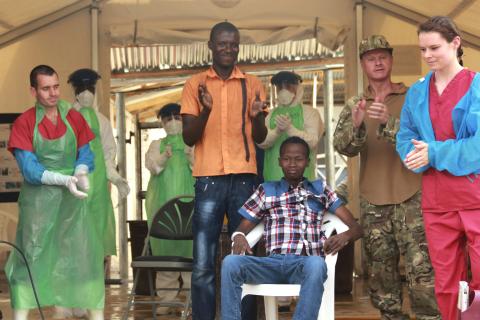Involving local communities: the Ebola case

The report published in March 2015 by Medecins sans frontières speaks out clearly against the “global coalition of inaction” and the “vacuum of leadership” in the Ebola crisis in West Africa. Those who were struggling in the field against a huge and out-of-control emergency, without the necessary resources, list the main causes of such a situation: lack of political will, inexperience, and, sometimes, simply fear.
At the beginning of 2015, WHO director Margaret Chan acknowledged that her agency was totally unprepared to face such a threat, promising the deepest reform of the organization since its foundation, in 1948. This change should transform a technical and advisory agency into an operative body, equipped with stable funds for emergencies and with a ready-to-go team made up of doctors, healthcare assistants and epidemiologists.
A similar promise had already been raised after the controversial pandemic alarm in 2009, but now it could really be the right time to realize that supranational institutions must be enforced and provided with more independence, not weakened and subordinated to special interests.
Coherently, WHO recognized its own mistakes by stating – with humility and an unusually straightforward language – eight main lessons through which the organization could improve its activity and “play its rightful place in disease outbreaks, humanitarian emergencies and in global health security”. It also called all world leaders to do what is necessary in order to ensure that such a disaster will not happen again.
Of these lessons, two are of particular interest for the development of the activity of the ASSET project, since they are related to communication and community mobilization(1).
In the regions stricken by the Ebola outbreak, people spontaneously mobilized, rallying groups of volunteers to provide surveillance, spreading information, identifying infected persons and establishing checkpoints at many communities’ access points. According to several observers, such voluntary initiatives have played a major role in the containment of the epidemic, even more than the huge investments for the late construction of centres for patients. In Liberia, the American army set up eleven centres with hundreds of beds, which were completed only around Christmas 2014, when the spread of the disease was already declining: in the end, only 28 patients have been assisted in two of these centres, whilst the others remained completely empty.
The Italian NGO Emergency had a well-established presence in Sierra Leone for more than ten years, since the Civil war. It could therefore give a prompter response, thanks to a long-lasting dialogue with the local community, enabled and strengthened by trust and knowledge established in the previous years. For instance, in Waterloo – a former refugee camp from the time of the civil war, two hours away from the capital – Emergency supported several local volunteers by establishing a stable outpost equipped for training, information, triage and transfer of suspected cases with an ambulance.
Similar activities, in cooperation with those raised by spontaneous mobilization, manage to prevent resignation and despair, and help to build trust. However, international authorities often disregarded them, even if, by giving space and consideration to such a kind of intervention, it would have been possible not only to prevent several deaths, but also to lay the basis for a faster “reconstruction” of the region.
Contact and communication with the local communities would have also facilitated to implement clinical trials for potential experimental therapies.
Even in this field mistakes were made. First of all, in some of the few studies launched, no randomized controls were included, since they were considered unethical (while the contrary is true, in case of uncertainty). Without comparison with current treatment, in fact, results from trial cannot be significant, thus representing a waste from every perspective, including the moral one.
Then, priority should have been given to test well-known drugs, already in use for many years to treat other diseases, and supposed to be potentially useful in Ebola as well. This approach could avoid unknown risks for patients and, in case of positive result, a solution immediately available without restriction and at a lower cost. However, such an opportunity was not grabbed.
Finally, one of the objections raised against randomized clinical trials was the impossibility to obtain a proper informed consensus. It is indeed a difficult task, also in less dramatic and more developed contexts, but not only for clinical trials. Every kind of individual or collective treatment – be it experimental or not – during the course of a tragic event like the Ebola epidemic, would require an extraordinary effort to inform and involve patients and their families.
One more time, dialogue, listening, communication, along with people and community mobilization, are the keys not only to achieve success against health threats, but also to fulfil our duties as human beings.
Roberto Satolli
(1) The author has been in Sierra Leone in November 2014 at the Emergency Centre, and participated to the efforts aimed at launching a clinical trial against Ebola based on amiodarone.
